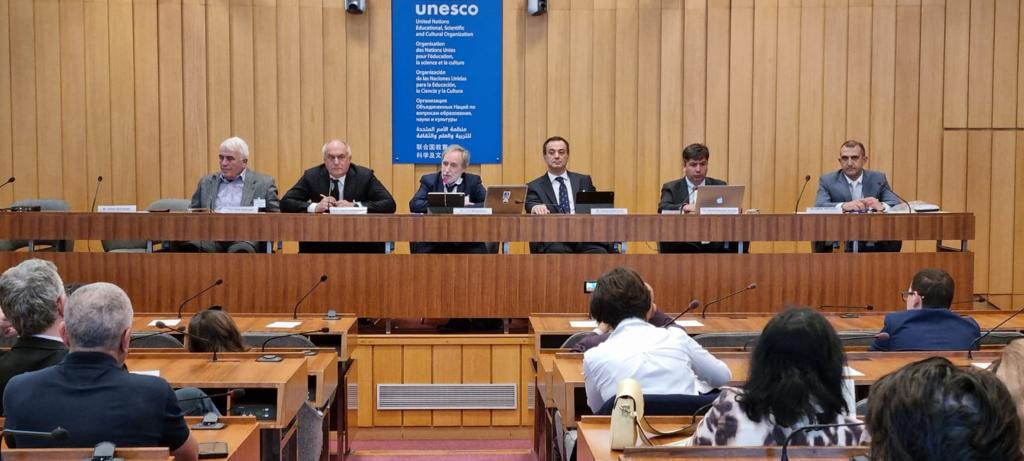Within the framework of the events dedicated to the "Year of Shusha" announced by the Decree of the President of the Republic of Azerbaijan Ilham Aliyev, the album-book "Karabakh Khanate: historical and cultural identity" published on the initiative of the Heydar Aliyev Foundation and with the support of the Ministry of Foreign Affairs of Azerbaijan was presented at the international level this week by UNESCO. continued in
APA reports that the book contains rare exhibits related to the rich cultural heritage of the Karabakh Khanate kept in the Georgian National Museum (GMM).
This valuable research work carried out by Georgian scientists within the framework of the project was widely discussed at the seminar on "The role of regional cooperation in the detection and protection of material cultural heritage" held on October 21 in Paris, at the headquarters of UNESCO.
Elman Abdullayev, Permanent Representative of Azerbaijan to UNESCO, who welcomed the participants of the event, assessed the research project as a contribution to the demand for international cooperation on the protection of cultural heritage arising from the 1972 World Heritage Convention.
French journalist Jean-Michel Brun, host of the event, said that the cultural heritage of the Karabakh region, which is part of Azerbaijani culture, such as mugham, architecture, carpet weaving, and horse riding, are pearls of not only Azerbaijan, but also world culture.
The Director of the National Museum of Georgia, the famous archaeologist Professor David Lordkipanidze, who made a wide-ranging speech at the event, informed about the unique projects that have been carried out in recent years with the support of the Heydar Aliyev Foundation in the National Museum of Georgia and have been carried out in the direction of uncovering the material evidence of the rich historical and cultural heritage of Azerbaijan.
He noted that as a result of this cooperation, the "Masterpieces of History" exhibition, organized a few years ago in the Heydar Aliyev Center in Baku, made it possible for a wide foreign audience to get acquainted with the rare exhibits related to the historical and cultural heritage of the Iravan Khanate of Azerbaijan found in the funds of the National Museum of Georgia.
Professor Eldar Nadiradze, the head of the group of authors of the book "Karabagh Khanate", said that this research work, prepared on the basis of objective ethnographic materials collected during the Russian Empire, once again proves the superiority and deep historical roots of Azerbaijani culture in the Karabakh region for many centuries.
Expressing gratitude to his Georgian colleagues for their dedicated work, the representative of the Azerbaijan History Museum noted that the cultural heritage of the Karabakh Khanate is a continuation of the millennial culture of the historical Azerbaijani states that ruled the region before him.
"During my visit to the liberated Karabakh, I witnessed the barbaric destruction of the Azerbaijani heritage as a result of the 30-year Armenian occupation," said Daniel Pomier Vincelli, a researcher at the Sapienza University of Rome.
Summing up the discussions, Azerbaijani MFA ambassador for special tasks Elshad Iskanderov said that, taking into account the almost complete destruction of the Azerbaijani heritage by Armenia in the Karabakh region during the occupation, "deep research of the heritage of the Karabakh Khanate preserved in foreign museums is of special importance in terms of uncovering the historical truths".
In this regard, the "Year of Shusha" initiative, announced by the Decree of the President of Azerbaijan Ilham Aliyev, gave an impetus to the international research and promotion of scientific truths about the Karabakh region and, in particular, the Azerbaijani identity of the ancient city of Shusha.
It is in the "Year of Shusha" that under the auspices of the Heydar Aliyev Foundation, the rich collection of the history of the Karabakh Khanate, which has been hidden in the archives of Tbilisi for more than 100 years, is published in the form of a prestigious scientific publication, and the first presentation of this publication is held in the liberated Shusha, which has a deep symbolic meaning.
Elshad Iskanderov expressed confidence that the research of Georgian scientists in this direction will continue to be the center of attention of the wide historical and cultural community.
At the end of the event, diplomats, UNESCO experts, as well as representatives of culture, public and media of France, who participated in the seminar, were presented with an edition of the book "Karabakh Khanate" translated into English, French and Arabic languages.
